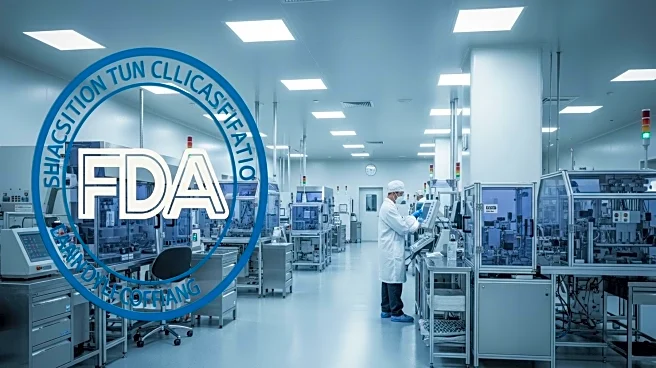What's Happening?
The FDA has issued its most severe inspection classification, Official Action Indicated (OAI), to Novo Nordisk's Indiana manufacturing plant. This classification indicates an 'unacceptable state of compliance' following an FDA inspection. Novo Nordisk acquired
the site in a $16.5 billion buyout of Catalent in early 2024. The OAI classification has created uncertainty over regulatory timelines for clients such as Regeneron and Scholar Rock, who have products manufactured at this facility. Regeneron has already experienced delays, with the FDA pushing back its decision date for two high-dose Eylea applications. Scholar Rock faced a rejection for its spinal muscular atrophy drug apitegromab. Novo Nordisk is working to address the issues, but analysts at BMO Capital Markets suggest that the problems may not be resolved quickly enough to prevent further delays.
Why It's Important?
The OAI classification of Novo Nordisk's Indiana plant has significant implications for the pharmaceutical industry, particularly for companies relying on this facility for manufacturing. Regeneron and Scholar Rock are directly affected, facing potential delays in drug approvals and market entry. This situation highlights the critical role of compliance in pharmaceutical manufacturing and the potential impact of regulatory actions on business operations. The delays could affect the companies' financial performance and strategic plans, as timely drug approvals are crucial for revenue generation and competitive positioning. The broader industry may also face increased scrutiny and pressure to maintain high compliance standards to avoid similar setbacks.
What's Next?
Novo Nordisk is expected to continue addressing the compliance issues at its Indiana plant, although no clear timelines have been established for resolution. Scholar Rock has requested a Type A meeting with the FDA to discuss the path forward for its drug apitegromab. Analysts predict that Regeneron may face another complete response letter for Eylea HD in October if the issues persist. The FDA's ongoing oversight and potential further actions could influence the resolution timeline and impact the companies' strategic decisions. Stakeholders will be closely monitoring the situation for updates on compliance improvements and regulatory decisions.
Beyond the Headlines
The situation at Novo Nordisk's Indiana plant underscores the importance of robust quality control and compliance in pharmaceutical manufacturing. The presence of contamination, including cat hair and bacteria, raises concerns about product safety and efficacy. This incident may prompt industry-wide discussions on best practices for contamination prevention and management. Additionally, the regulatory scrutiny could lead to increased investment in compliance infrastructure and training to prevent future occurrences. The ethical responsibility of pharmaceutical companies to ensure product safety and maintain public trust is highlighted by this case.















